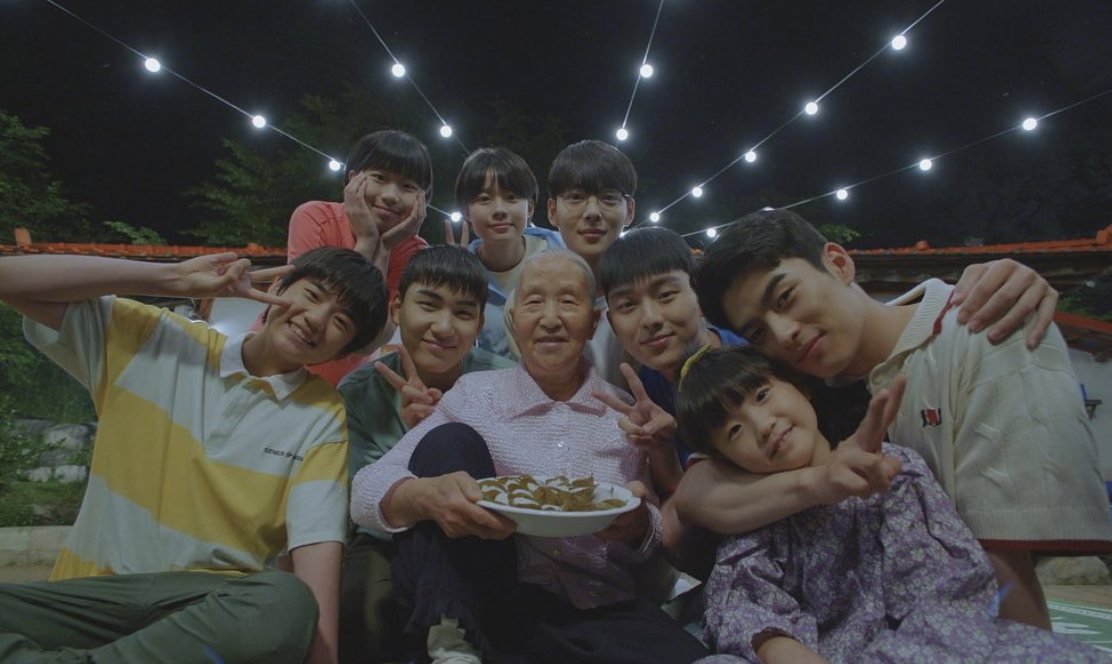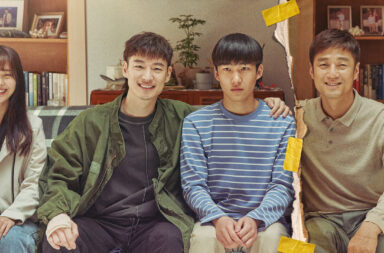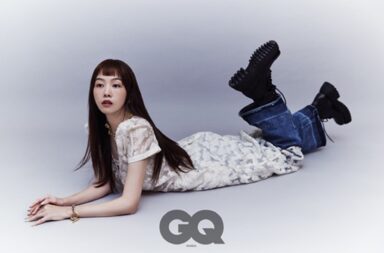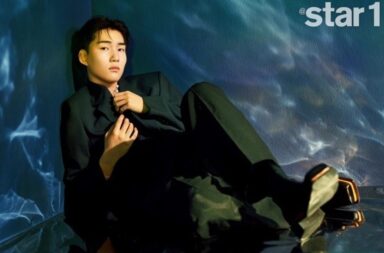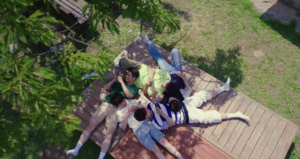
After a pre-emption and a change in episode frequency (from two episodes per week to one), youth badminton drama Racket Boys finally came to an end this week. It was a much-anticipated conclusion to this gem of a drama, and while it was predictable, it was satisfying all the same.
This review contains spoilers.
The first eight episodes of this drama were a great introduction to our sprawling ensemble of characters, all of whom felt lived-in and were mostly likeable. With its badminton premise, the conflicts were also well-established– the drama is essentially an underdog story following the small badminton team of Haenam Seo Middle School who eventually fought their way to national victory. And yet, there was so much more story to tell in the next half of the drama, as the players battled personal insecurities, physical injuries and navigated new relationships.
For starters, it was as if the writer, Jung Bo-hun, took all my criticisms about the first half of the drama and tackled them through this second stretch. The international controversy generated over the drama’s portrayal of Indonesia in a badminton competition from Episode 5 was addressed in Episode 9, when the junior national team played a friendly match with the Japanese national team. Rather than being driven by their rivalry or the history between Japan and Korea, as their coaches had assumed, genius badminton player Han Se-yoon (Lee Jae-in) explained that the teams were actually friends, who play badminton because they love the sport. Rather than bringing matters of international diplomacy into the court, these youths simply have a passion for the sport, and this was a great perspective to present.
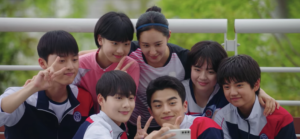
Additionally, the earlier episodes did not have many scenes of the students actually playing badminton. Instead, we had matches where viewers were only privy to that final match point, but this improved in the second half of the show. For Lee Yong-tae’s (Kim Kang-hoon) individual match in the National Junior Sports Festival (NJSF) tournament, the show actually depicted a point by point game, heightening the tension and displaying the gradual change in Yong-tae’s playing style through the game.
With Yoon Hae-kang (Tang Joon-sang), Bang Yoon-dam (Son Sang-yeon), Lee Han-sol (Lee Ji-won) and Se-yoon qualifying for the national junior team, the drama also explored more intensive forms of training. From sandbox training to rubberband step training, it gave viewers more insight into a world of badminton that we might not have been as familiar with.
Thankfully, these improvements did not come at the expense of the quality storytelling that we enjoyed in its first half, and Racket Boys continued to deliver heartwarming tales week after week. The theme of “found families” became more prominent with Kang Tae-seon’s (Winner‘s Kang Seung-yoon) reunion with his former coach, White Wolf Coach Bae (Shin Jung-geun). Tae-seon had felt guilty towards Coach Bae ever since Coach Bae had unfairly shouldered the blame for abusing the badminton team a decade ago, but the forgiveness and love he found when he returned was truly moving.
Coach Bae and his wife had never forgotten or blamed Tae-seon, instead they had maintained his room in their home in the hopes that he would one day return to them. It is also fitting that Tae-seon would embark on his journey into the national team with Coach Bae by his side, and it was such a satisfying resolution to see him achieve his goal by the drama’s end (although we never got to see Tae-seon play…).
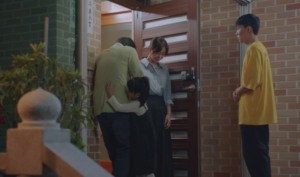
Shin Pil-ja and Kim Tae-ho (Park Hyo-joo and Jung Min-seong), formerly known as the city couple, also found a new family in Ttangkkeut village. It’s been gratifying to watch their journey, with their initial struggles in getting used to the country life, their realistic conflicts with their new neighbours and eventually the way the villagers all embraced each other, differences and all. Pil-ja and Tae-ho proved essential in defending the village against developers who wanted to transform the village into a golf course, and in protecting Shin Song-hee’s (Baek Ji-won) inheritance from her unfilial siblings, using their city smarts to save the day.
It was a beautiful touch to have the city couple’s names revealed only after we got to learn more about their tragic backstory – at this point, they became more than just “the city couple”, they were full-fleshed characters with histories and individual personalities. Their suicide attempt from Episode 2 was already a powerful plot point, but this was pushed further in Episode 11 when the killing power of hurtful words was illustrated.
The gossip and slander that both Pil-ja and Tae-ho experienced in their previous workplaces were difficult to witness, but it became easier to understand why they felt driven to end their lives. The thoughtless words of the villagers about Pil-ja’s infertility very nearly drove the couple away once again, but this time, acts of love (in the form of Hae-kang’s terrible curry) and the genuine bonds that had been formed among the villagers over the past year motivated them to stay.
Speaking of genuine bonds, Pil-ja asking for Song-hee’s name for the first time in Episode 12 was the start of their blossoming friendship and was significant in proving that Pil-ja no longer saw Song-hee just as her mother’s daughter, or just as the fierce village guardian, but saw Song-hee for herself. What a powerful statement.
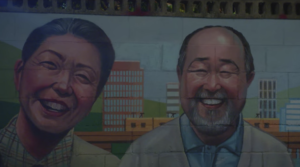
Similarly, viewers waited till Episode 15 to learn about Oh Mae Grandma’s real name, Kim Jeom-deuk (Cha Mi-kyung). It was a great revelation that the name that Jeom-deuk had been practising and learning to write, Choi Mi-ja, was her mother’s name and not her own. While it was a touching moment, it was also effectively timed since it turned the tables on the property developers, who had illegally used the signatures of deceased persons from the village to create an 80% total of people in agreement with the development.
It was a short but great arc for Jeom-deuk, and I love the way Jung Bo-hun gives depth to most of his supporting characters beyond their defined roles in the drama. For instance, former badminton coach/sports shop owner Mr Noh (Ahn Sang-woo) could easily have been limited to his role of equipment provider/supporter of the Racket Boys, but instead, he was given a more pivotal role to play in uncovering the mystery behind the White Wolf and in finally exposing the true abuser.
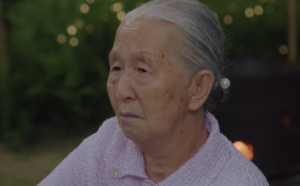
Another supporting character who had one of the best storylines in the drama would be Big Grandma (Lee Seon-bok), who left such an impact even though she had only one line in the whole drama. Her gentle nature stood at such a great contrast to her daughter Song-hee’s fiery temper, but she was hilarious in her muted reactions towards the shenanigans of the villagers. Her birthday celebration in Episode 10 was also a highlight of the drama, as Yong-tae thoughtfully enlisted Hae-kang, Se-yoon, Yoon-dam and Han-sol to film the sights of Busan, Big Grandma’s hometown, and to bring back tasty souvenirs.
It was a great example of intergenerational bonding, and it is so refreshing to see young characters treating older characters with such love and respect. We also got to see more of Big Grandma’s perspective in this episode as well, observing the ways she quietly but enthusiastically supports village activities, cheering with them when they won the village relay and searching frantically with them when Hae-in (Ahn Se-bin) went missing.
To learn that Big Grandma became mute due to the shock of losing her husband was devastating, but it was all the more powerful when she finally spoke at her deathbed, to apologise to her daughter. Big Grandma’s passing was heartbreaking, but it was masterfully handled, and became a form of release for both Song-hee and Ra Yeong-ja (Oh Na-ra), who finally mourned for her own mother, who had tragically passed away on the day that Yeong-ja became an Asian Games gold medallist.
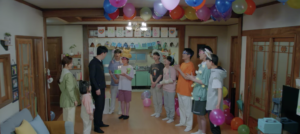
Speaking of Yeong-ja, she was greatly challenged in this second half of the series as she started to confront many of the biases she had in her coaching and to realise the impact of her words and actions on her players.
While she has always been dedicated in caring for the wellbeing of her players and training them to the best of her abilities, she also had a big blindspot in her over-reliance on Se-yoon. Even if she does not say so, her actions and decisions betray the fact that she does not actually have confidence in the team to win competitions without their star player. This became evident during the NJSF, when Se-yoon was unable to fly back from another competition in time to play in the finals.
Yeong-ja seemed to lose all hope of victory at that point, and was not really present for Han-sol even though Han-sol was playing against a seemingly undefeatable opponent from Seoul. It took some nasty gossips for Yeong-ja to realise that she had already given up on her players, even before they went to the court, and that wake-up call drove her to eventually step up as a coach for Han-sol once again. It was difficult for Yeong-ja to realise her failings as a coach, but her team embraced her and helped her to believe in herself again.
In a similar way, the Haenam Seo Middle School team really changed Yoon Hyeon-jong (Kim Sang-kyung) for the better, despite his many failings. While he did turn over a new leaf and worked hard for his team, even creating great strategies for them through the matches they had, he also frustratingly misunderstood them, especially when Hae-kang had an eye injury.
Out of concern for his son’s health, and a realisation that he never really asked Hae-kang what he wanted to pursue in life, Hyeon-jong decides to force Hae-kang into a break and prevent the rest of the team from meeting him. It was a terrible move on his part, considering how earnestly the team wanted to meet their friend again, and bad communication on all fronts, but eventually they clear the air and Hae-kang makes clear that he wants to stay on this team, and keep playing badminton.
To the credit of the Haenam Seo boys, they also did not bear grudges against their coach, and instead prepared a surprise birthday celebration for him. Hyeon-jong was completely undeserving of their love at that instance, but it is precisely this warm and forgiving community that motivates Hyeon-jong to keep trying his best for these boys.
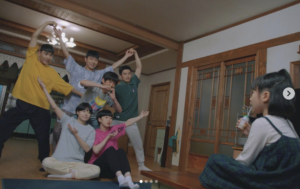
A big part of what makes Racket Boys so enjoyable is the genuine friendships forged within the badminton team, and their warmth is so infectious that it extends outwards too, touching lonely characters like Tae-seon and melting the hearts of rivals like the Busan team.
Many characters commented throughout the show that they envied the friendship that the Racket Boys shared, and I could not agree more. Hae-kang would never openly declare his affection for his teammates, but when Jung In-sol (Kim Min-ki) was bullied, Hae-kang was the first to defend him. They are also so supportive of one another, encouraging each other to grow and improve their badminton skills. “Win together, lose together” was a motto that Coach Bae taught the team from the start, and they definitely displayed this spirit throughout the drama.
The underdog plotlines, not just of the teams but of individual players such as Han-sol and Woo-chan, were so empowering and were true highlights of the drama. In Han-sol’s case, as Se-yoon’s badminton partner, she always had to deal with insecurity about her own skills, and jealousy of Se-yoon’s prowess. All of this, while acknowledging what a good friend Se-yoon is, and how much she likes being around her.
This combination of complex and conflicting feelings is so true-to-life, and it was painful watching Han-sol lash out at Se-yoon as a result of her stress over the NJSF. This made it so much more satisfying however, when Han-sol was able to overcome this mental hurdle once and for all, bringing home the victory for her team. The revelation that Se-yoon was rushing back to Korea to support her team rather than to play for them was also a great one, displaying how much of a team player Se-yoon is despite her individual achievements. Friendship at its finest!
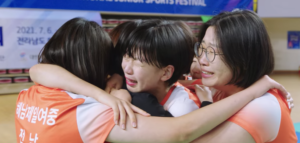
Woo-chan finally got his spotlight in the final match of the NJSF, where he worked together with Hae-kang to secure the victory for his team. His great defensive abilities were discussed throughout the drama, and they came into play here as he compensated for Hae-kang’s eye injury but covering their defenses. It was a great message to send home – that we do not all need to strive for success in the same way (i.e being a great offensive player for instance), rather we can embrace our individual strengths and work together with others to achieve greater success.
Racket Boys did a great job at maintaining its youthfulness, and it felt pure in a way that few dramas nowadays do. This extended to its treatment of the lovelines, which were an absolute delight. Kicking off with Yoon-dam and Han-sol, the first couple to be established, it was great to watch how Han-sol’s puppy love turned into a lovely and supportive relationship. They were there for each other in the highs and lows, and were absolutely adorable throughout the series.
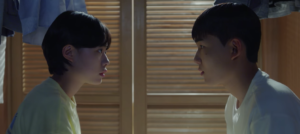
Hae-kang and Se-yoon’s relationship was more of a slow burn, although there was no doubt about both their feelings for each other. It was obvious from the way Se-yoon only ate the snack that Hae-kang bought for her instead of the whole bag that Park Chan (Yoon Hyun-soo) gave her, and from the way Hae-kang willingly let himself get caught by Coach Paeng (Ahn Nae-sang) so that Se-yoon could escape punishment.
Each walk they took, each moment they shared — they were all heart-fluttering. They were open with each other, they let themselves be crybabys in front of each other, and they just had such an organic, healthy relationship. There was no unnecessary angst, not much of a love triangle (although the rivalry between Hae-kang and Park Chan was quite enjoyable to watch), just a blossoming of youthful love.
On the comedic front, we also had romantic developments between Mr Hong (Woo Hyeon) and Song-hee, which only emerged towards the end of the series, but was a hoot to watch. Their delighted embarrassment when Song-hee decided to move in with Mr Hong was hilarious, but it was also endearing to watch how Mr Hong had stuck by Song-hee all the way, even driving miles with her to get pulbbang for Big Granny. They definitely deserve their happy ending.
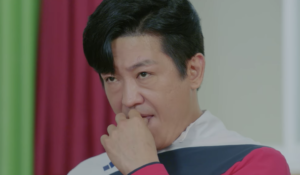
I could go on about how lovely Racket Boys is, but it had its flaws, particularly in terms of pacing. This drama was clearly made to be watched two episodes at a time (i.e according to its original Monday-Tuesday schedule), since a lot of the conflicts or plot points brought out in the odd episodes were resolved in the even ones.
When the drama’s schedule changed, however, we ended up with conflicts that felt dragged out because we only saw its resolution one week later. The mission that Yong-tae sent the two budding couples on in Busan in episode 9 for instance, did not make any sense until episode 10, when it turned out to be for Big Grandma’s birthday celebration. It was definitely still meaningful, but viewers were likely to forget the details of their Busan mission in the week that elapsed between the episodes, which reduces the impact of the payoff.
The mystery surrounding the White Wolf also felt very long-drawn, probably because we went through Episode 2, where Hyeon-jong discovered for the first time that Coach Bae was actually the White Wolf. That first revelation took us the whole episode, thanks to everyone’s unnecessary secrecy, but in Episode 10 we got a repeat of that with the badminton team finding out about the White Wolf’s identity and his dark past. It eventually linked nicely to the conflict about the abusive coach and his treatment of the Hwasun boys, but it took a long time for the writer’s true intentions to emerge. The recycling of this plot point in particular felt frustrating and confusing.
Racket Boys is definitely not a perfect drama, and there are segments that require some patience to get through, but it is definitely worth your time, for all the meaningful and beautiful stories it contains. The main characters are utterly lovable, the friendships and romances are enjoyable to watch, and there are a lot of poignant life lessons that can be gleaned from it as well.
(Instagram. Images via: SBS.)
